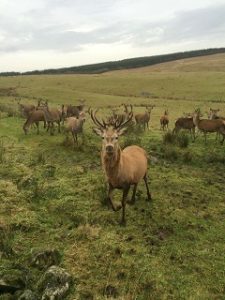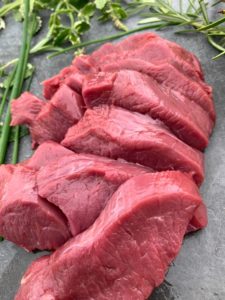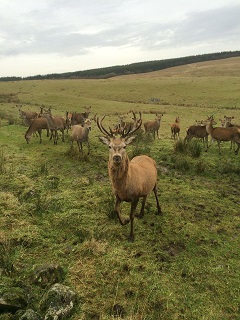Sustainable Meat –
Venison is the ultimate sustainable meat
Deer are wild. Even when they’re farmed, they resist domestication. This means they’re always free-range and are not intensively produced, the ultimate sustainable meat.
Wild deer populations are booming
In Scotland the deer population has been booming. With no natural predator left over recent years and deer have been becoming a bit of a pest. Because they cause a lot of damage to woodlands and trees, deer are often culled. So if you eat wild venison, not only has your meat had as natural a life as it possibly could, but you’re also helping to stop a small bit of deer-related deforestation and making sure that good meat doesn’t go to waste. Scottish Venison Associate is proud of the Short supply chain
Low Carbon input
Even farmed deer mainly eat grass and not grain. They can be farmed on marginal land like sheep. Land that’s only good for growing grass.
Cleverly, deer naturally reduce their appetite in winter, when grass is more scare and go into semi hibernation. Farmed deer are often given hay and reject root vegetables in winter. These can easily be produced locally and makes good use of second-rate veg that us humans might turn our noses up at.
Low Veterinary Input
Unlike other domesticated farm animals, deer haven’t been selectively bred over centuries and so they don’t suffer from many of the diseases that traditional farm animals do. This means that they don’t need to be given antibiotics and other drugs that are commonly given to intensively farmed, non-organic cows, which also can end up on your plate.
High Animal Welfare
The most humane way to kill a deer is to shoot it in its natural habitat, which is still legal for game. This means that, unlike other farmed livestock it is spared a distressing final journey to the abattoir (which, unless the cow walks there, also creates carbon emissions). The deer is instantly killed and suffers no distress. Other deer appear unconcerned by one of their number suddenly disappearing.
Good health reasons to eat venison.
Venison is very low in fat and cholesterol and is much better for you than other meats. It’s often recommended as part of a low-fat diet. It also contains more iron than any other red meat. You can use it to make burgers, sausages, Bolognese, stews, casseroles or simply cook it as a steak. Pretty much anything you do with beef you can do with venison.
Venison is sustainable on three levels:
- Ethically – You can be guaranteed that the animal your meat has come from has lived a life that is wild and free to roam around doing exactly what it was meant to – it really doesn’t get more free range than this!
- Environmentally – Keeping the environment healthy that suits deer has benefits for all manner of other indigenous species, flora and fauna alike.
- Economically – By eating Game meat you are supporting an important part of the rural community that makes our Great British countryside exactly that – great.
Given that Venison is better for you, cheaper and less damaging for the planet than similar meat, try buying venison.
NUTRITIONAL ANALYSIS OF RAW GAME MEAT SAMPLES
Partridge |
Pheasant |
Venison |
Lamb |
Beef |
Turkey |
Chicken |
|
Energy (kcal/100g) |
112 |
119 |
104 |
172 |
191 |
111 |
105 |
Energy (kJ/100g) |
476 |
505 |
442 |
720 |
800 |
469 |
443 |
Protein (g/100g) |
25.8 |
27.1 |
23.4 |
20.8 |
23.1 |
25.2 |
20.1 |
Fat (g/100g) |
1 |
1.2 |
1 |
9.9 |
11 |
1.1 |
1.5 |
Cholesterol (mg/100g) |
85 |
66 |
85 |
90 |
99 |
65 |
90 |
Saturated fatty acids (g/100g) |
0 |
0.39 |
0 |
4.75 |
4.39 |
0 |
0.5 |
MUFA (g/100g) |
0 |
0.54 |
0 |
3.76 |
5.31 |
0 |
0.58 |
PUFA (g/100g) |
0 |
0.21 |
0 |
0.96 |
0.81 |
0 |
0.35 |
Vit B1 (mg/100g) |
0.03 |
0.023 |
0.021 |
0.052 |
0.039 |
0.073 |
0.15 |
Vit B2 (mg/100g) |
0.015 |
0.019 |
0.011 |
0.022 |
0.033 |
0.013 |
0.012 |
Vit B3 (mg/100g) |
2.67 |
3.77 |
1.64 |
7.62 |
9.34 |
5.75 |
6.3 |
Vit B6 (mg/100g) |
0.13 |
0.061 |
0.061 |
0.053 |
0.074 |
0.11 |
0.11 |
Vit B12 (ug/100g) |
0.94 |
0.57 |
0.34 |
||||
Vit D3 (ug/100g) |
0.12 |
||||||
Iron (mg/100g) |
0.7 |
1 |
2.4 |
1.6 |
1.4 |
0.2 |
0.2 |
Sodium (mg/100g) |
37 |
40 |
44 |
43 |
49 |
64 |
37 |
Zinc (mg/100g) |
0.7 |
0.8 |
1.8 |
2.5 |
3.5 |
1.2 |
0.5 |
Selenium (mg/kg) |
0.43 |
0.37 |
0.04 |
0.08 |
0.04 |
0.1 |
0.1 |
Ash (g/100g) |
1.1 |
1.2 |
1.2 | 1.1 | 1 | 1.2 | 1.2 |
| Total solids (g/100g) | 27.1 | 28.8 | 26 | 31.5 | 34.7 | 26.6 | 25.5 |



